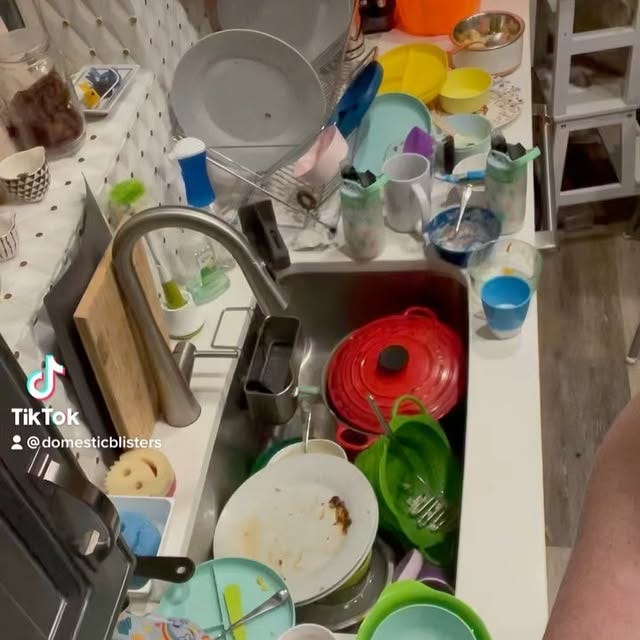We're Running Out of Clean Underwear
The Merits of Doing and Not Doing Your Laundry When the World is Falling Apart
Today I posted on my instagram stories asking both cis and trans therapists how they’re doing. This has thus far already led to a number of meaningful exchanges, including one where I acknowledged to a friend (and former supervisor - I love having ongoing connections with mentors) that I am currently doing okay by many measures, but only because I’m not keeping up with household tasks. Which is maybe to say I’m not doing okay.
There is clean laundry that has sat unfolded for literal weeks in our living room. There is other clean laundry that has been awaiting attention in the dryer for days. I have not kept up with my daily litter box scoopings and the cats also need their nails trimmed. My car is so full of all sorts of things that I would be embarrassed for a friend to see it (forgive me my shame - I am but human). And until a few days ago our porch was so filled with boxes and winter gear you could barely get into the house.

We’ve been busy. And more than that, we’ve been tired and our brains are full. When our brains are full, their functioning is limited. My partner and I forgot to bring the book we’re reading to a book club. There are tupperware containers to be returned to friends that we have to walk by to get out the door, and we’ve forgotten to take them with us to see said friends multiple times. And when we get to the end of the day, I’m more apt to mindlessly scroll or do something that feels good than fold laundry - if I even remember it as a task that needs to be done. And I can’t even fully get into the way I’ve lost track of my email inbox: the likelihood of me responding efficiently to a non-clinically-urgent email has dropped to less than 50%.
I’m sharing all of this because I think it is similar for many people right now. The cognitive load of these days is just beyond what we’re used to and perhaps what we’re equipped for. Anecdotally, stimulant prescriptions like adderall have been increasing in demand even more than anti-anxiety benzodiazepines (though those are also increasing) - a signal that people are feeling the strain of too much cognitive demand for available cognitive resources.
And (half of) my official advice as a psychologist is fuck it. Drop the ball. Wear your underwear two days in a row or inside out if you haven’t done laundry. Step around the mess on your front porch. Reply late to emails (though this is tricky and I’ll come back to why). I’m reminded of the work of therapist KC Davis, who wrote the book How to Keep House While Drowning and has created a lot of content encouraging self-compassion around mess/housekeeping when it’s overwhelming (e.g., because of depression, neurodivergence, or maybe fascist government takeovers) and how to engage in cleaning and organizing tasks while being gentle with yourself. Specifically, I’m thinking of a video she made where she showed a kitchen that was full of clutter and mess, and she said instead of feeling like you have to get that kitchen totally neat and spotless, just clear off and clean enough of the counter and enough dishes that you can fix yourself a meal. She also has a video (linked below) of her rinsing an overwhelming clutter of dirty dishes in the sink and organizing them into piles next to the sink, highlighting that while she didn’t feel able to motivate herself to wash the dishes, she could do that, and it made her feel better and probably would make it easier to use the sink and do the dishes later.
When we are overloaded, we are often best served by a combination of radical acceptance of our circumstances and limitations and adaptive strategies that accommodate those limitations while allowing us to complete our priorities (e.g., making food for ourself). The subtitle of this substack is the merits of doing and not doing your laundry. This is the not doing part. Sometimes, you’re just not going to stay on top of your tasks or remember all the things, even when that results in mess and backlogs and non-ideal situations. And accepting that is going to serve you a lot better than berating yourself for it.
And there are merits to doing your laundry too. I think KC Davis’ video I referenced and posted above is a really good example of this. For most of us, the visual of the cluttered sink full of dirty dishes will evoke a different set of emotions than the visual of an organized pile of dirty dishes or a clear counter. Our brains tend to prefer order and simplicity for ease of processing. When we are cognitively overloaded and/or emotionally overwhelmed, it is very helpful to reduce additional stimuli like visual clutter or mess. Clutter and uncleanliness can represent unfinished tasks and research has found it is associated with elevated stress hormones. It also can remind us of the fact that we are overwhelmed or stretched thin and contribute to a meta-emotional downward spiral of sorts - we are overwhelmed by overwhelm and then overwhelmed by the byproduct of that overwhelm and then by that overwhelm, etc., etc. There’s also some interesting theory about the somatics and physical sense of space: when there’s clutter we perceive restriction of movement or there is actual restriction of movement, and this can change the way we are able to be present in our bodies in that space. Additionally, many organizing and cleaning tasks are repetitive and engaging in repetitive movement/tasks can be very soothing and regulating. I used to joke in graduate school about how much I loved folding clothes (ironic given my current backlog).
Here’s a big reason I am pro-doing your laundry, or whatever cleaning or organizing task you’re facing: Micro-empowerment. So many people right now feel like they have lost control of the world around them - or are waking up to a reality that they’ve never had much control. The disempowerment many Americans are feeling in this moment in history is profound. I’m hearing reduction in political self-efficacy at every level and folks’ overwhelm makes it feel as though we don’t have power over other aspects of our lives either. Many people are losing their jobs or facing job insecurity. Many of us our waiting seemingly helplessly to see what the economy will do and whether we’ll lose savings. It’s easy for disorder or lack of cleanliness to get folded into this narrative of disempowerment - “I can’t even keep my house clean.” Now, first of all, see above. It’s not a moral failing to not have a clean house or not reply to an email promptly. Interrupt the shame cycle here, please, and maybe it doesn’t have to be too disempowering to see household tasks undone. But even then, it is empowering when you can advance on a task, even partially.
Much like disempowerment has a halo effect and can have you feeling as though and thinking that you have lost all ability to influence your life, small bits of empowerment can help you rebuild your belief in your capacity to impact other spheres of your life. I picked up the porch (imperfectly - it’s not complete yet, but it’s visually much better and there’s freedom of movement) and my life felt less out of control.
A note here before I end on the relational piece of this: all of the examples of tasks I shared above very well could impact others if they’re not stayed on top of. If you have housemates or family living with you, the consequences of not doing household tasks or doing them imperfectly/incompletely will not only be felt by you. And sometimes it’s a safety issue. If the kitchen is too dirty, you risk contaminating food. If there’s too much clutter you might not see the choke hazard on the floor that your toddler can now get to. But even if it’s not a safety issue, how we are psychologically and emotionally impacted by these things will vary across people and navigating various needs on all sides of the “doing and not doing laundry” et cetera discussion is a part of sharing a home with people. Having potentially difficult but honest conversations with each other can help disrupt narratives that often get brought into conflicts about this (e.g., “you aren’t doing this because you don’t care that it affects me”) and help people arrive at mutually acceptable compromises and adaptive systems. It can also help folks learn what needs to be prioritized and what can be deprioritized and/or what can be outsourced.
In that vein, not replying promptly to emails or texts or forgetting to run an errand that someone was depending on - these things could negatively impact another person and/or make them feel neglected. Sometimes this is a consequence we have to accept during times of overload or near-overwhelm, but often I think we can use a combination of prioritizing and transparent communication to minimize the effects on others. For example, it is part of my obligation as a licensed health service psychologist that my clients can reach me, so I have to triage my emails at least once a day and make sure I’m responding to clients in need. And I’ve started telling people when I give out my email that I am imperfect about responding but welcome follow-ups and nudges, though I am sorry that that will sometimes be required as I know it’s extra effort for others. Establishing with friends what they need from you in terms of communication when you’re overloaded and/or engaging in some transparent repair if you’ve not responded for a while goes a long way.
So I think I will try to remind myself in the coming however long that folding laundry is often going to be a better use of my time and brain space than mindless scrolling. But I also will have grace for myself when mindless scrolling happens or I drop the ball on something. And to my spouse when you’re reading this, this is not a verbose way for me to write off the things we’ve agreed need to be prioritized :)
Godspeed, my friends.





